EU leaders are standing once more at a crossroad. Returning to the status quo ante is not an option. We are facing several deep-rooted crises, which are intertwined and man-made. Let’s seize the moment, let’s change Europe for the better.
The European Commission and the governments of the EU will have to make some serious choices. They will have to answer their citizen’s questions and address their needs.
- Why are essential workers, who keep society running, badly paid?
- Why aren’t we acting to avert catastrophic climate breakdown?
- Why do the rich get richer while inequality keeps rising?
- Why do we let thousands die on the EU’s borders?
EU leaders have to act. Not for corporate Europe, but for the sake of a rising generation, for EU citizens and for those who need a Europe that’s a safe place, a motor for social justice, and a climate change pioneer.
Can Commission President Ursula von der Leyen’s second State of the Union speech on September 15th be the beginning of a new strategy? A realistic approach, at last, to the real challenges people face?
Here are seven things we need to hear VDL say in her SOTEU speech:
Afghanistan – assume responsibility, provide solutions

Since the Taliban takeover in August, peoples’ lives in Afghanistan have been put at major risk. They need immediate protection.
Europe bears responsibility for the current situation and has an absolute duty to help, support, and welcome Afghans who need to get to safety.
This means providing humanitarian corridors and visas, additional resettlement places, quick reviewing of rejected asylum applications, and facilitation of family reunification for people fleeing the Taliban and refugees in general. The Fortress Europe ‘business as usual’ approach cannot be allowed to prevail. Europe cannot continue blocking refugees from seeking safety and dignity.
The Migration Pact proposed by the Commission last autumn was a slap in the face for anyone who stands for human rights. It should be withdrawn and replaced with a humane system by which member states take their responsibility for reception, and stop the outsourcing of EU border management to third countries.
As we witness another dramatic failure of war, political hawks and the arms industry in Brussels are once again pushing for EU militarisation as a solution. But we know from history that arms are a recipe for ever more war. The European Union should be serving the interests of the people instead of those of the weapons industry. As we battle our way out of a social, economic and environmental crisis, it makes no sense to throw billions more at a murderous industry.
What we need to hear from von der Leyen: “The plight of Afghans right now shows the absurdity of war. After 20 years of war and trillions spent, what has been achieved? We must focus resources on safeguarding human life and dignity, and stop frittering away public money on weapons. It’s time for a radical shift of paradigm on foreign affairs, migration, and militarisation. Europe was supposed to be a project for peace and humanity, let’s now work to make that a reality.”
The pandemic cannot be an excuse to make the rich even richer
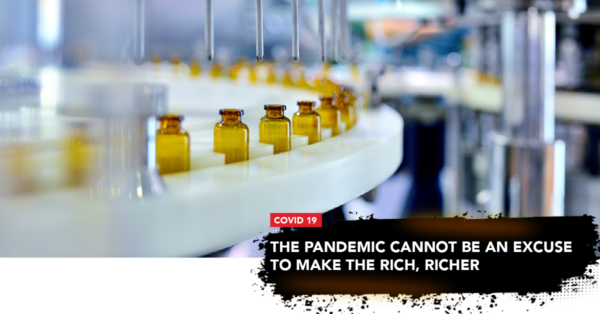
Health is not a commodity, it’s a right. Today’s race for vaccines and the global response to the Covid-19 pandemic risks replicating the same inequalities that plague the system we are living in. The fight for accessible vaccines for all, procured with transparency and accountability, is the battle of our time and will shape the future of health and healthcare for decades to come.
For many months the European Commission and the majority of the European Parliament kept dealing with the pandemic with the same old and ineffective business as usual approach. After a tight battle between Big Pharma and their allies, and the supporters of public health, the European Parliament voted through an amendment proposed by The Left to lift the patents on Covid-19 vaccines, treatments, and diagnostics. This was followed by a second vote on a resolution that strengthens demands for the European Commission to change tack and support negotiations on the TRIPS Waiver. This is not enough but is a positive step towards #VaccineEquality. Now we need the Commission to drop its relentless defence of Big Pharma greed and finally choose people over profit.
What we need to hear from von der Leyen: “Upon reflection, we simply got it wrong. The Commission will now use its influence in the WTO to fight for Covid-19 treatments and cures as a global public good, freely accessible to everyone, everywhere.”
Path to recovery = economic justice
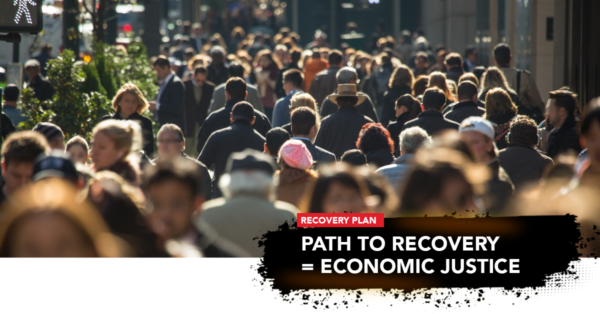
The pandemic showed that preventing member states from stimulating economic development was always a terrible idea. In order not to collapse under the initial blows of the crisis, the EU has revealed its cards: its blind economic policies are not working. The Stability and Growth Pact (with it’s tight restrictions on public spending), the almost total ban on state aid, all have been suspended due to the pandemic. Now it’s time to permanently put an end to austerity and let governments develop public investment in the real economy, improve schools and hospitals, tackle poverty and fight the climate crisis.
Europe still loses about €1 trillion to tax dodging every year. Making the billionaires – who have profited handsomely from the health crisis – pay up, and delivering fair taxation has never been more urgent. The Commission must ensure that multinationals are taxed where income is generated and work globally to set up a minimum effective rate to end the race to the bottom on corporate income tax. The 15% that the G7 have agreed on is weak. What is needed is a realistic rate, an excess profit tax and penalty taxes on financial flows in tax havens.
What we need to hear from von der Leyen: “I will push for a new set of economic, social and environmental policies in favour of working people. A key part of this will be delivering on tax justice to allow Europe to revive and improve its public services that have proven crucial to all of us, especially over the last year and a half.”
Climate crisis – wake up time

The fires and flooding that Europe and the world witnessed throughout the summer demonstrated yet again, in ever starker terms, that there is no place for false climate solutions.
Greening capitalism will not stop climate catastrophe, it will only further delay real climate action. A key opportunity to turn things around and get real about fighting the climate crisis will be the COP26 UN conference in Glasgow this November.
Policies to cut emissions need to go hand in hand with measures to achieve social justice. The green transition cannot be used to punish the poorest. New priorities for the Common Agricultural Policy are needed to support small producers and sustainable farming, to enhance food safety, reduce the use of pesticides, and protect animal welfare.
What we need to hear from von der Leyen: “Our climate ambition must be dramatically raised, that’s why I’m announcing proposals for a binding target of 70% CO2 reduction by 2030 and fully renewables-based energy by 2050. Our message in Glasgow will be that market-based mechanisms have failed. Only radical action is appropriate and proportionate as a response to this climate emergency.”
Values – stop talking, start acting
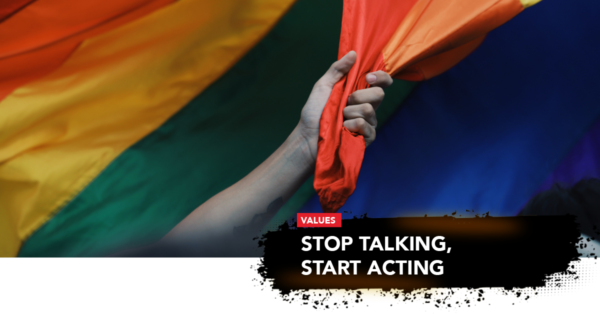
The EU portrays itself as the champion of democracy and individual freedoms. Yet, from attacks on women’s rights to LGBTIQ+ discrimination, from media censorshiop to judicial interference, right-wing governements in the EU have taken advantage of the pandemic to erode civil liberties and the rule of law in a variety of alarming ways.
Over the past year, we have seen reactionary forces attacking the rights of girls and women. Indeed, some right-wing governments took the pretext of the pandemic to put in place misogynist policies in a clear backlash against women’s rights – particularly targeting Sexual and Reproductive Health and Rights (SRHR). The rights of LGBTIQ+ people have also been on their radar, as ultra-conservative forces advance discriminatory measures – including the ban on LGBTIQ+ content from being featured in educational material in Hungary.
The Commission’s response up to now has been far too tame. As defender of the treaties, it must move much more decisively to champion the freedom of citizens to live and love as they wish, to assiduously promote sexual and reproductive health and rights, uphold freedom of speech and guarantee rule of law.
Moreover, the EU must support and promote universal and full access to SRHR services and reaffirm the protection and the elimination of gender-based violence, human trafficking, and poverty.
What we need to hear from von der Leyen: “Women, girls, LGBTQI+ people, minorities, all those who stand against the dark forces of repression that have repeatedly fed the hatred and destruction that have ravaged this continent in the past, destroying millions of lives, I stand with you! As your committed ally, I will make sure that this EU respects your dignity, your freedoms, your humanity and fundamental right to decide over your bodies and lives.”
Big Tech, a big problem
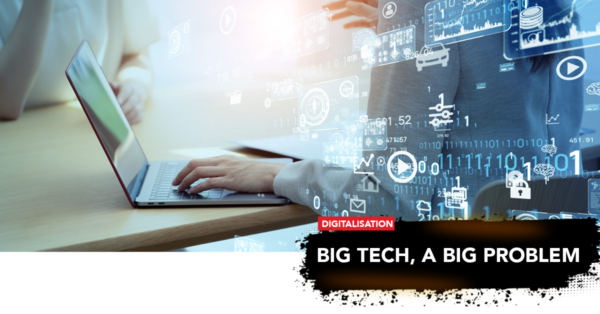
While working people have been put through the wringer since spring 2020, the Silicon Valley billionaires have upped efforts to intensify their global surveillance capitalism project to turn every aspect of human experience into a digital commodity. Their algorithms have pushed even deeper into our lives, our economy, news, relationships, politics, and physical environments, all while conveniently ripping us all off with some novel tax dodging practices. Big Tech is aggressively redefining human life in the 21st century in line with one clear aim: their own profit margins.
This will have to change. Digital democracy instead of tech monopoly is the future.The EU could play a key role in ensuring that the digitization process is put at the service of people, with democratic decisions taken to ensure that these technologies serve the needs of communities and the planet:
Exchanging ideas and simply staying in touch with each other is a basic need of ‘homo digitalis’. Social platforms should be rethought around these imperatives.
What we need to hear from von der Leyen: “Tech bros, listen up: your attacks on our democracy, privacy, mental health, and the economy will no longer be tolerated. We’re reining you in, now your companies will be rigorously regulated so that they work to serve the public interest. Comply or goodbye!”
Making Europe work for workers
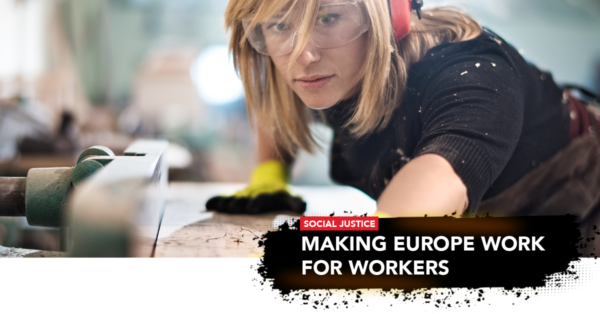
Often on low pay, under the most pressure, in unsafe conditions and facing in-work poverty… It was working people who got Europe last year. The EU needs to recognise that, and start building a future with workers and social rights on top of the agenda. This begins with eradicating the scandal of exploitation and guaranteeing fair conditions and wages across all sectors. It also means preventing companies in receipt of public subsidies from firing workers.
Crucially, platform workers in the so-called gig economy deserve the same rights as other workers. Digital platforms exploit gaps in legislation to deny them basic rights such as holiday and sick pay, social security contributions and union representation. This has given rise to degrading work conditions. The promised EU Directive on Digital Platform Workers should resist lobby pressure from big business and curb these abuses once and for all. Digitization also means working for social guarantees, for reducing working hours, for more participation and for better protection in terms of working standards.
What we need to hear from von der Leyen: “Over the coming months, the Commission will redouble efforts to ensure that workers’ rights standards are respected and strengthened. This means new rules to tightly regulate any company that has been taking advantage of weak rules and enforcement to exploit workers and add more billions to their bank accounts. Enough! Between now and the end of my mandate, I will build an EU that works for workers.”
Follow our reaction to von der Leyen’s SOTEU speech on Twitter, Facebook and Instagram, and find out more about our proposals here
